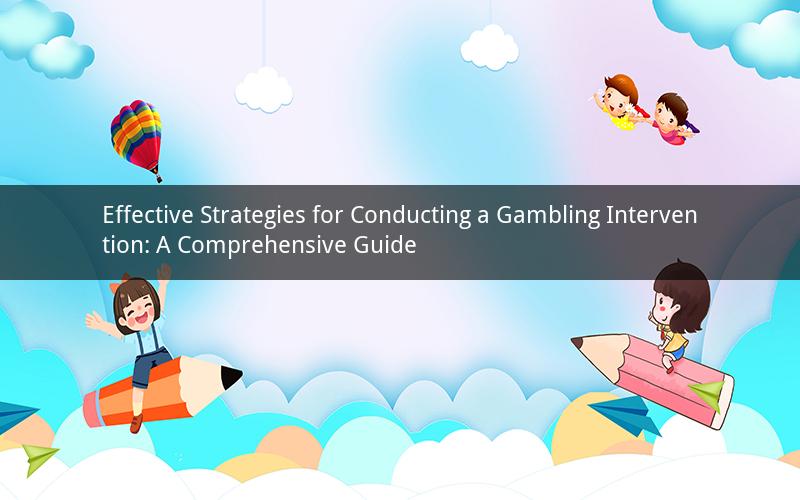
Introduction:
Gambling addiction is a prevalent issue that affects countless individuals and their families. Interventions for gambling are essential tools to help individuals recognize and overcome their addiction. This article delves into effective strategies and techniques for conducting a gambling intervention, offering insights into how to approach this sensitive and challenging situation.
1. Understanding the Problem
Before embarking on a gambling intervention, it is crucial to have a thorough understanding of the problem. Familiarize yourself with the signs and symptoms of gambling addiction, including financial strain, relationships affected, and an inability to control gambling behavior.
2. Building a Support System
A strong support system is essential for a successful intervention. Gather a team of loved ones, friends, and professionals who are committed to helping the individual. Ensure that everyone involved is aware of their roles and responsibilities during the intervention.
3. Planning the Intervention
Thorough planning is vital for a well-executed intervention. Consider the following aspects:
a. Setting: Choose a quiet, private location where the individual will feel comfortable and undistracted.
b. Time: Schedule the intervention during a time when the individual is likely to be available and receptive.
c. Participants: Ensure that the right people are present, including those who have been affected by the individual's gambling.
d. Order of Discussion: Arrange the conversation in a logical order, starting with the least confrontational topics and gradually addressing more challenging issues.
4. Approaching the Intervention
The following strategies can help facilitate a productive and empathetic intervention:
a. Open with Love and Concern: Begin the intervention by expressing your love and concern for the individual. Make it clear that your goal is to support them, not to judge or criticize them.
b. Share Personal Experiences: Share personal stories and examples of how gambling addiction has affected you and others. This can help the individual relate to the situation and understand the gravity of their addiction.
c. Highlight the Consequences: Clearly outline the negative consequences of gambling addiction, including financial, emotional, and social implications. Use real-life examples to demonstrate the severity of the problem.
d. Offer Support: Reassure the individual that they are not alone and that there are resources and treatment options available to help them overcome their addiction.
5. Encouraging Change
Encourage the individual to take responsibility for their actions and commit to making positive changes. Consider the following techniques:
a. Motivational Interviewing: Use motivational interviewing techniques to explore the individual's readiness for change and identify their underlying desires and values.
b. Setting SMART Goals: Assist the individual in setting Specific, Measurable, Achievable, Relevant, and Time-bound goals to facilitate progress and accountability.
c. Providing Resources: Offer information about treatment options, support groups, and other resources that can aid in the recovery process.
6. Post-Intervention Support
After the intervention, it is crucial to maintain ongoing support for the individual. Consider the following actions:
a. Follow-Up Meetings: Schedule regular follow-up meetings to monitor the individual's progress and offer support.
b. Encourage Continued Treatment: Encourage the individual to seek professional help, attend therapy sessions, and participate in support groups.
c. Monitor Behavior: Keep a close eye on the individual's gambling habits and provide support as needed.
5 Questions and Answers:
1. Q: How do I ensure that the individual feels safe and supported during the intervention?
A: Create a supportive environment by expressing love, concern, and empathy throughout the conversation. Avoid confrontational language and focus on the individual's well-being.
2. Q: What if the individual becomes defensive or refuses to participate in the intervention?
A: Stay calm and patient. Allow the individual to express their feelings without judgment. If they refuse to participate, consider involving a professional interventionist to facilitate the process.
3. Q: How can I encourage the individual to seek professional help?
A: Highlight the importance of professional treatment and share information about therapists, support groups, and other resources. Offer to assist in finding appropriate professionals and accompanying them to appointments.
4. Q: What if the individual relapses after the intervention?
A: Relapse is a common part of the recovery process. Encourage the individual to learn from their mistakes and continue seeking support. Remind them that recovery is a journey, and setbacks are not the end of the road.
5. Q: How can I maintain my own well-being while supporting someone with a gambling addiction?
A: Seek support for yourself by joining support groups, attending therapy sessions, or speaking with a trusted friend or family member. Set boundaries and take care of your own needs to ensure you can provide the best possible support to the individual.